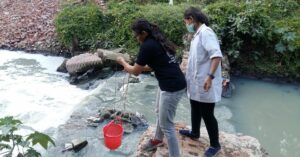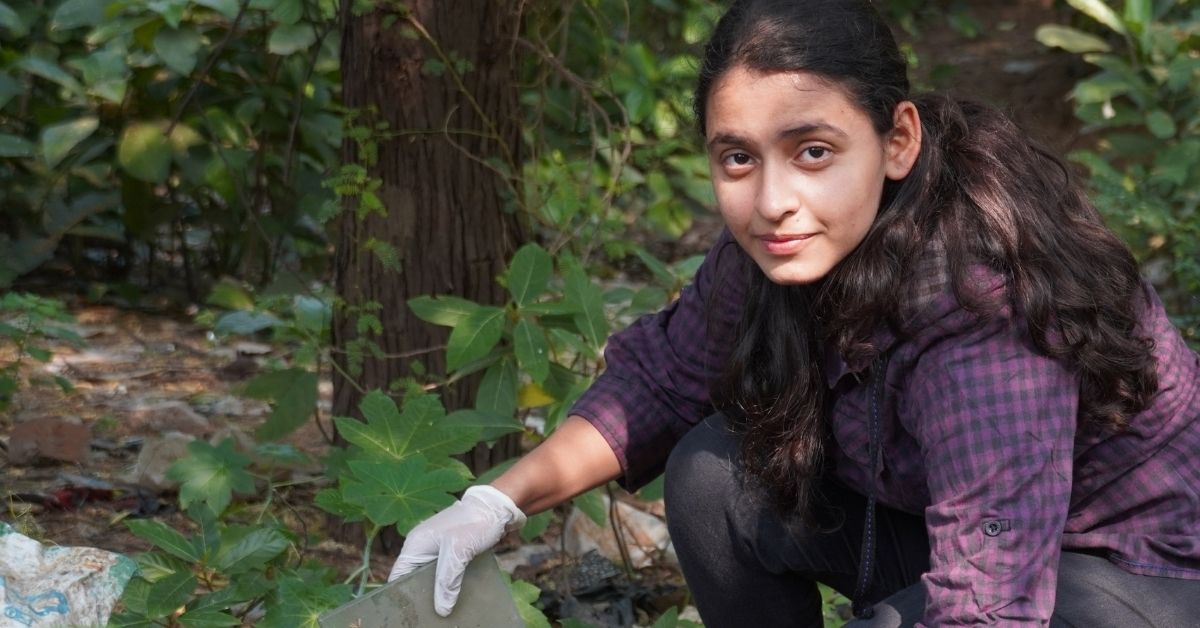Growing up in Gujarat, Sneha Shahi was always a girl who showed a keen interest in environmental activities.
It was this interest that prompted her to enrol in UNEP’s Plastic Tide Turner Challenge started in her college, Maharaja Sayajirao University of Baroda, in 2019. An MA Environmental studies student, Sneha signed up 300 other students from her college and eventually became one among the 18 affiliated members selected from the country for this campaign.
Even though each student from Sneha’s campus joined the campaign to be a part of an attempt to protect the environment, none of them imagined that their activities would, in due course, bring back living beings to their ecosystem.
“To initiate the campaign, we chose to clean up a drain inside the campus. But later, we realised that it was a natural stream — home to several living organisms. However, it was clogged up with plastic waste,” says Sneha.
In a joint effort, students removed over 700 kg of plastic from the urban stream. During the monsoon, Gangetic Flapshell turtles and crocodiles found their way to the stream. Other insects and plants also grew in their surroundings.

She adds that for the safety of students, fences were installed by the university.
Waste collected from the stream, including microplastic, thermocol and glass bottles were recycled. Some of them were turned into wall hangings and planters inside the campus.
Later, the Bhukhi Stream Project nominated Sneha and her team the Youth for Earth Award.
Turning challenges into accomplishments
Asked about the biggest challenge faced during the campaign, Sneha explains, “Making people aware was a tough task. For most of them, throwing garbage in public places and streams was a normal act. The after-effects of such deeds were shared and it took some time to see them react positively.”
Sneha opines that a few months after beginning the campaign, there have been notable changes in the attitude of students as well as neighbourhood people. “Today, when someone throws plastic waste in public spaces, people question them and ask to take it away. They used to join with us in cleaning activities and continue to do even today with our junior batches,” says Sneha in satisfaction.
UNEP’s Plastic Tide Turner Campaign is funded by the United Kingdom and has reached over 2,25,000 youth residing in 25 different countries. The initiative is a crucial element of the British government’s pledge through its 25 Year Environment Plan to reduce ocean plastic. In India, it is backed by the government and will be rolled out through 1,60,000 schools.
“I always had this affinity towards nature. The campaign has been a great opportunity to meet some incredible people with different interests but one goal — save our planet,” says Sneha, who is now pursuing her PhD in Extreme Hydrological Events at ATREE, Bengaluru. “I monitor the work of my juniors at Baroda and work on a project in increasing resistance for people in agriculture.”
As a child, while travelling through the North East region, she noticed that even with heavy rainfall, people depend on communal taps for drinking water for lack of infrastructure. All these factors pushed her into this field which she says is a “diverse subject” and there has been “no turning back” since the very beginning. Even before being a part of this international campaign, Sneha used to work for local NGOs in cleaning and water conservation activities.
Her message to her fellow youth activists is: “If you don’t know the difficulties of water scarcity and pollution, that means you are privileged. The underprivileged ones are always affected the most. But very soon it will reach everyone. Do your bit today to save for tomorrow.”
(Edited by Yoshita Rao)
If you found our stories insightful, informative, or even just enjoyable, we invite you to consider making a voluntary payment to support the work we do at The Better India. Your contribution helps us continue producing quality content that educates, inspires, and drives positive change.
Choose one of the payment options below for your contribution-
By paying for the stories you value, you directly contribute to sustaining our efforts focused on making a difference in the world. Together, let's ensure that impactful stories continue to be told and shared, enriching lives and communities alike.
Thank you for your support. Here are some frequently asked questions you might find helpful to know why you are contributing?

